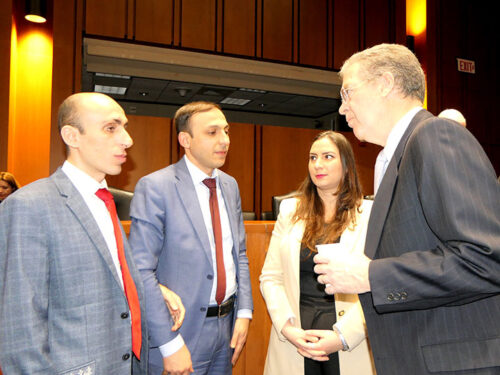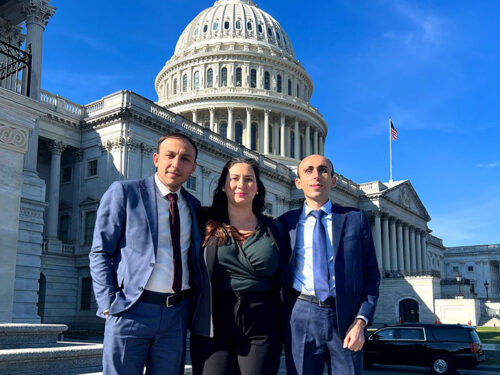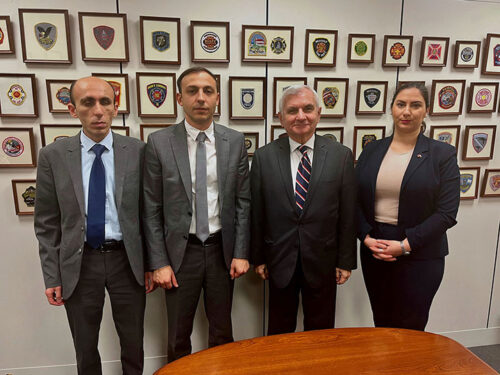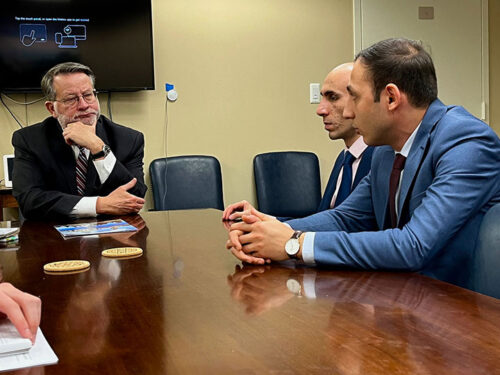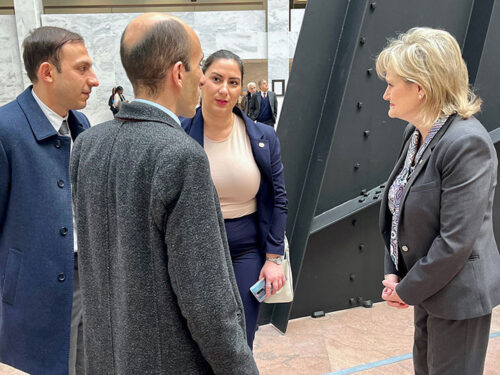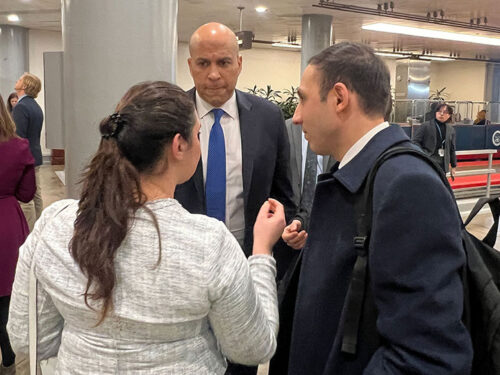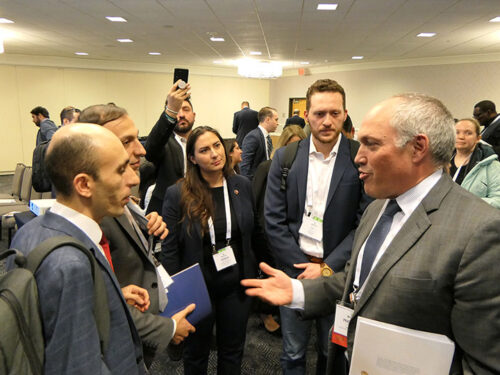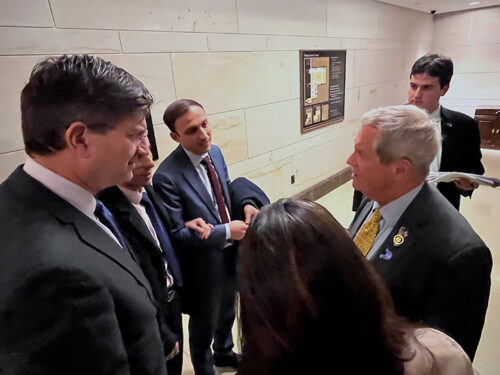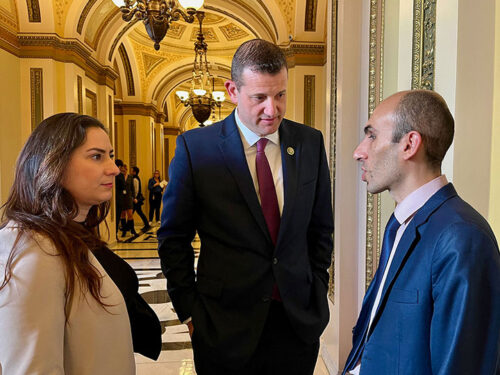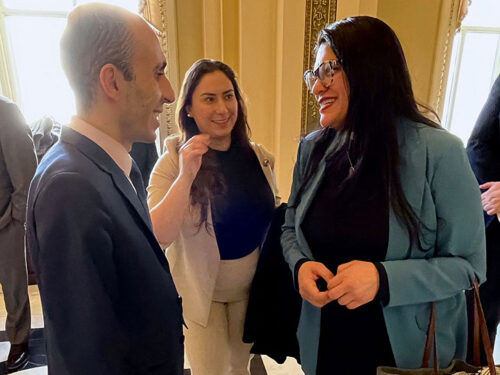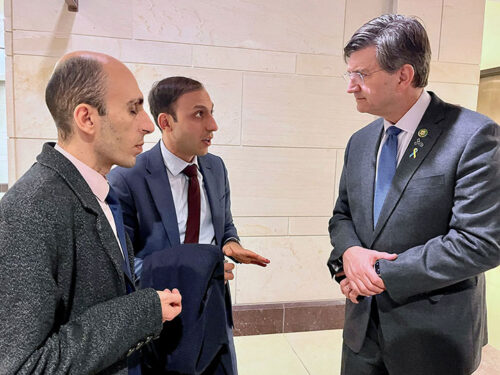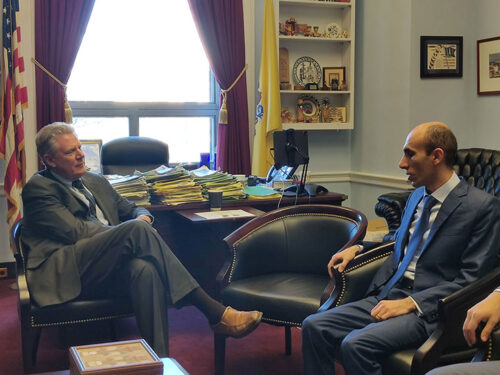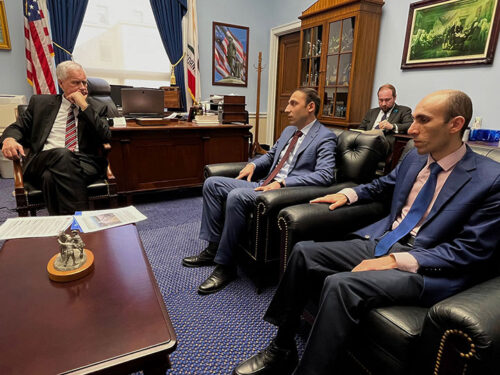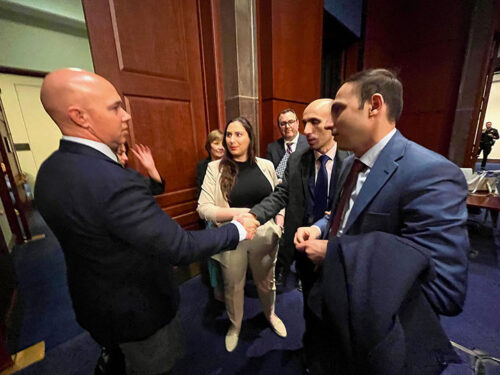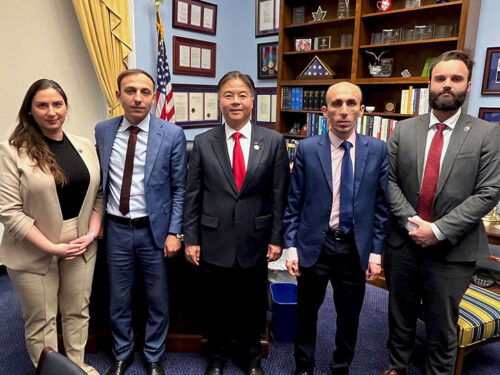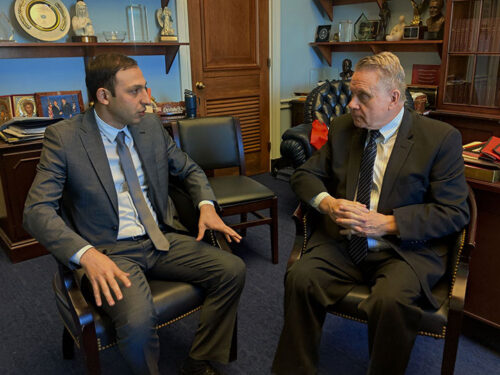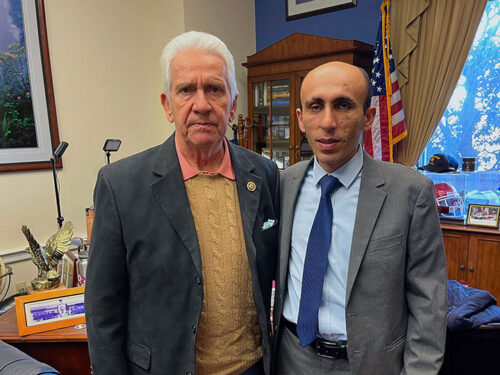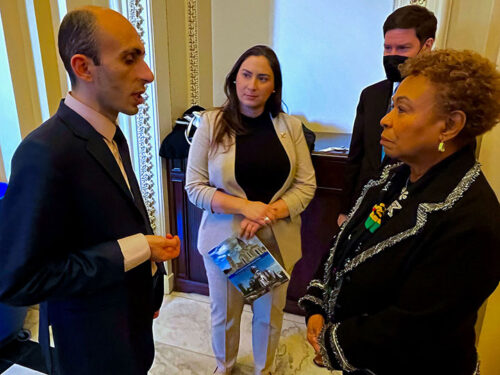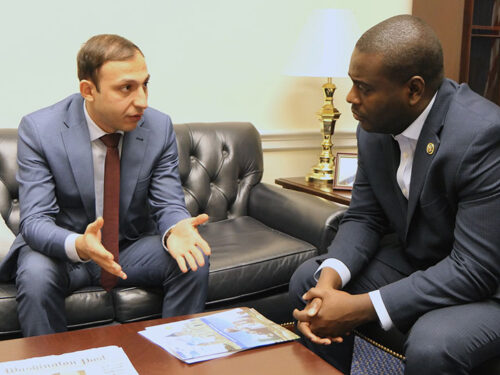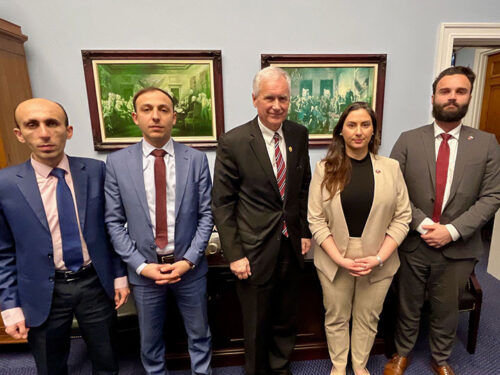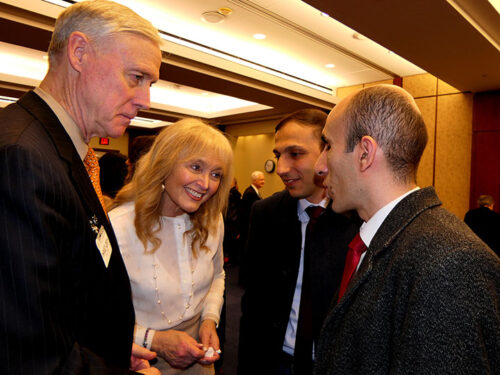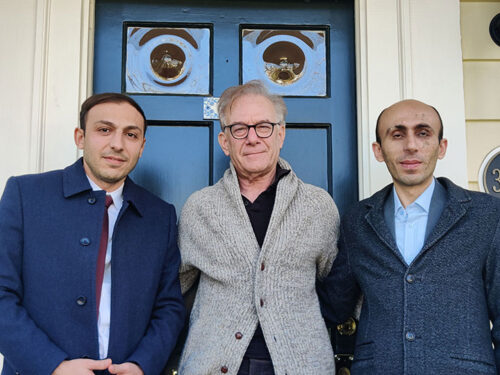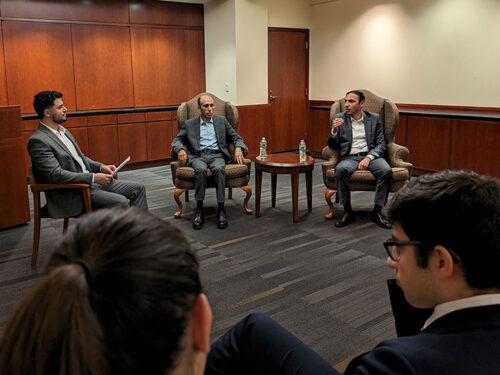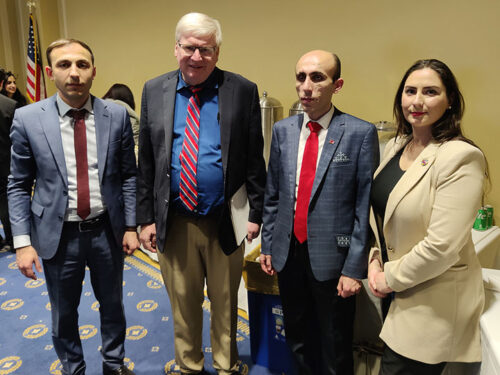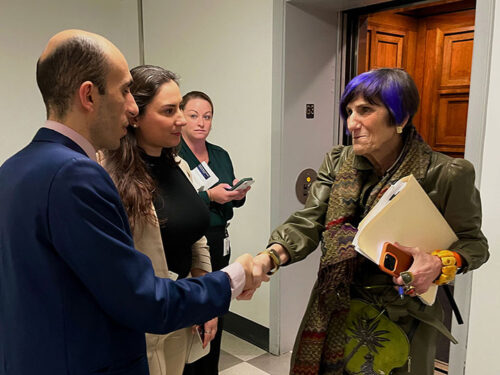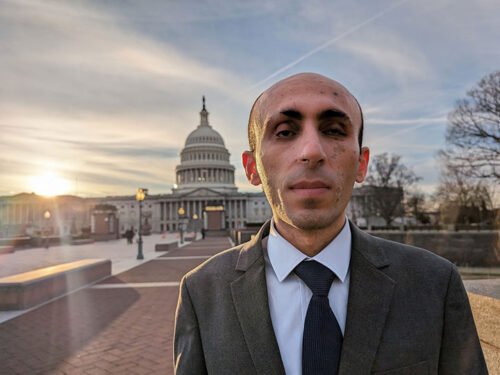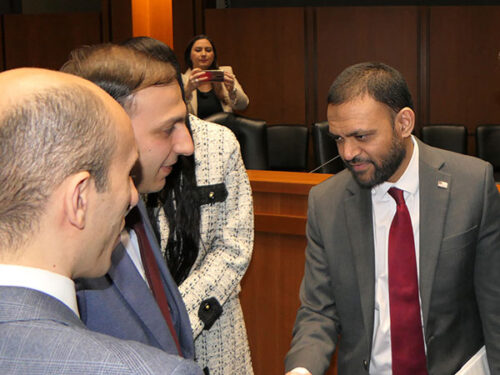Stepanyan and Beglaryan Advocate for Rights and Safe Return of Artsakh’s Armenians
Artsakh Human Rights Defender and Former State Minister Complete Two Week Visit to Washington, DC
February 16, 2024WASHINGTON, DC – Republic of Artsakh (Nagorno Karabakh) Human Rights Defender (Ombudsman) Gegham Stepanyan and former State Minister Artak Beglaryan concluded a two-week advocacy mission to Washington, DC that called on U.S. Congressional leaders, Administration officials, and a broad array of faith-based and human rights groups to hold Azerbaijan accountable for the genocide against Artsakh’s 150,000 indigenous Armenian Christians and to provide support to refugees as mechanisms are explored to ensure their safe return to the homes from which they were forcibly displaced.
The Armenian National Committee of America (ANCA) joined with Stepanyan and Beglaryan in over 60 meetings and briefings with Congressional offices, coinciding with the introduction of two resolutions that would cut military aid to Azerbaijan’s genocidal regime, holding Azerbaijan accountable for its crimes.
In the Senate, Senators Ed Markey (D-MA) and Bill Cassidy (R-LA) introduced a bipartisan resolution (S.Res.540) that would require the State Department to provide a detailed description of widely documented human rights abuses perpetrated by Azerbaijan, pursuant to Section 502B(c) of the Foreign Assistance Act, which could block all military aid to the genocidal Aliyev regime.
U.S. Representative Mike Lawler (R-NY) was joined by Congressional Armenian Caucus Co-Chairs Frank Pallone (D-NJ) and Gus Bilirakis (R-FL) and House Foreign Affairs Committee member Gabe Amo (D-RI) in introducing the House counterpart (H.R.7288) of the Senate’s unanimously-adopted “Armenian Protection Act,” (S.3000), which would block US security aid to Azerbaijan for two years.
Stepanyan and Beglaryan offered eye-witness accounts of the brutal realities of Azerbaijan’s ten-month blockade of Artsakh, which culminated in the September 2023 genocidal attack that forcibly emptied Artsakh of its indigenous Armenian population. In addition to the passage of the latest legislation urging an end to U.S. support for Azerbaijan’s genocidal actions, the Artsakh people’s advocates urged:
— Sanctions on Azerbaijan, including the enforcement of Section 907 and the application of Magnitsky sanctions on Aliyev government officials for war crimes and ethnic cleansing committed during the 2020 Azerbaijan-Turkey attacks against Armenia and Artsakh and subsequent genocidal aggression.
— U.S. aid for Artsakh’s forcibly displaced Armenians, including housing and job placement assistance, until a secure mechanism can be put in place through international oversight and mediation with Artsakh authorities to guarantee the safe and dignified return of forcibly displaced Armenians to their Artsakh homes.
— Expanded U.S. and international efforts to help secure the immediate release of Artsakh leaders, POWS, and all the other captured persons illegally held by Azerbaijan since the 2020 Azerbaijan/Turkey attacks and the 2023 aggression.
— Preservation of Artsakh’s Armenian cultural and religious heritage already vandalized or under threat of destruction by Azerbaijan.
Stepanyan and Beglaryan stressed that without international efforts to address the Artsakh people’s right to safe return, dignified life in Artsakh, and justice for the crimes committed, it will be impossible to establish sustainable peace in the region. They also emphasized that the systemic anti-Armenian hatred fomented by the Azerbaijani Government must be eradicated to ensure an enduring settlement of the conflict and regional stability.
While in Washington, DC, Beglaryan and Stepanyan participated in the International Religious Freedom Summit, co-chaired by Amb. Sam Brownback, the U.S. Ambassador at Large for International Religious Freedom (2018-2021) and Katrina Lantos Swett, President of the Lantos Foundation for Human Rights.
During a presentation made to a diverse group of faith-based organizations and US government officials, Stepanyan explained, “I speak before you today not just as the human rights defender (Ombudsman) of my people but as a witness and a survivor of genocide.” He stressed that the world is witnessing the systematic erasure of “the Christian and world heritage of Artsakh (Nagorno-Karabakh), of its ancient churches and hallowed cemeteries, now standing silent under the shadow of occupation and desecration by the dictatorial Aliyev regime of Azerbaijan.” Stepanyan urged faith leaders and government officials to rally together and serve as “the shield that protects the vulnerable, the voice that speaks for the silenced and the light that pierces the darkness of cultural erasure. Only then can we ensure that the soul of Artsakh, its ancient and sacred Christian heritage, is not lost forever.”
“Artsakh’s rights were center stage these past two weeks in Washington, DC, as two of the Republic’s most eloquent voices – Artak Beglaryan and Gegham Stepanyan – made the case to U.S. legislators and international religious freedom leaders for the safe return of indigenous Armenians to their ancient homeland,” said ANCA Executive Director Aram Hamparian. “Over the course of dozens of Congressional meetings, legislators heard first-hand about the Artsakh Genocide and explored the concrete U.S. steps needed to restore this integral part of the Armenian homeland.”
Beglaryan and Stepanyan’s visit was part of a 120,0000 Reasons coalition effort, supported by the Tufenkian Foundation and the Philos Project, and over 20 human rights, faith-based, and ethnic organizations, calling on the US Government to hold Azerbaijan accountable for its genocide against Artsakh’s Armenian population and to prevent further aggression against Armenia.
The Artsakh people’s representatives also participated in a fireside chat, organized by the George Washington University Armenian Law Students’ Association, where they shared the ongoing challenges facing Artsakh’s displaced and the need for concrete political and legal action. They also shared their powerful message of survival and issued an international call to action during a series of press interviews
In addition to educational efforts in the nation’s capital, the trip also included a robust series of meetings with international organizations and community leaders in New York. While in Washington, DC, they met with the U.S. Department of State and the U.S. Agency for International Development.
Earlier, Stepanyan and Beglaryan participated in meetings with California state and local government officials, various university law programs, and community forums organized through the Armenian Bar Association, in conjunction with their annual meeting.
The Artsakh advocates offered an overview of their meetings in the US during a press conference (in Armenian) held in Yerevan upon their return, available here:
#####
